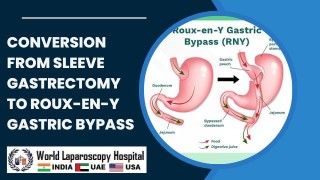MGB-2: Revolutionizing Metabolic and Bariatric Surgery – Dr. Robert Rutledge at WALS 2025
Add to
Share
139 views
Report
1 month ago
Description
MGB-2: Revolutionizing Metabolic and Bariatric Surgery – Insights from Dr. Robert Rutledge at WALS 2025 The field of metabolic and bariatric surgery is witnessing a transformative evolution, and at the forefront of this change is the MGB-2, an advanced iteration of the Mini Gastric Bypass (MGB) pioneered by Dr. Robert Rutledge. In his highly anticipated address at the World Association for Laparoscopic Surgeons (WALS) 2025 conference, held on February 25, 2025, Dr. Rutledge shared groundbreaking insights into how the MGB-2 is redefining surgical approaches to obesity and metabolic disorders, offering new hope to patients worldwide. The Legacy of Dr. Robert Rutledge and the MGB Dr. Robert Rutledge, widely regarded as the "father of the Mini Gastric Bypass," introduced the original MGB in 1997. This procedure, designed as a simpler, safer, and more effective alternative to traditional gastric bypass surgery, quickly gained traction for its ability to deliver significant weight loss and metabolic improvements with fewer complications. Over the decades, Dr. Rutledge has performed thousands of MGB surgeries and trained surgeons globally, cementing his reputation as a visionary in the field. The MGB involves creating a smaller stomach pouch and rerouting the small intestine to limit food intake and absorption, achieving both restrictive and malabsorptive effects. Its advantages—shorter operative times, reduced hospital stays, and a favorable safety profile—have made it a preferred option for many patients and surgeons. However, Dr. Rutledge has never rested on his laurels. His relentless pursuit of innovation has now led to the development of the MGB-2, an enhanced version poised to further revolutionize bariatric surgery. Introducing MGB-2: A Leap Forward During his WALS 2025 presentation, Dr. Rutledge unveiled the MGB-2, describing it as a "next-generation solution" that builds on the foundation of the original MGB while addressing its limitations and incorporating modern surgical advancements. The MGB-2 refines the technique with precise anatomical adjustments, optimized for even better outcomes in weight loss, metabolic health, and long-term patient well-being. Key enhancements in the MGB-2 include: - Improved Anti-Reflux Mechanism: One criticism of the original MGB was the potential for bile reflux. The MGB-2 introduces a modified anastomosis design that minimizes this risk, ensuring greater comfort and safety for patients. - Enhanced Precision: Leveraging laparoscopic and robotic-assisted technologies, the MGB-2 allows surgeons to achieve unparalleled accuracy during the procedure, reducing operative time and tissue trauma. - Customizable Malabsorption: The MGB-2 offers flexibility in adjusting the length of the bypassed intestine, tailoring the procedure to individual patient needs—whether the goal is aggressive weight loss or metabolic improvement. Dr. Rutledge emphasized that these refinements make the MGB-2 not just a surgical procedure, but a personalized therapeutic tool, adaptable to the diverse needs of patients with obesity and conditions like type 2 diabetes. The Future of Bariatric Surgery Dr. Rutledge’s presentation sparked excitement among the global surgical community at WALS 2025, with many attendees eager to adopt the MGB-2 into their practices. He underscored the importance of training and collaboration, announcing plans to expand educational programs through the World Mini Gastric Bypass Surgeons Association, where he serves as Honorary President. The MGB-2 arrives at a pivotal moment. With obesity rates soaring worldwide and metabolic diseases straining healthcare systems, the demand for effective, accessible interventions has never been greater. Dr. Rutledge envisions the MGB-2 as a cornerstone of this effort, combining cutting-edge technology with a patient-centered approach. A Visionary’s Call to Action Closing his talk, Dr. Rutledge urged surgeons to embrace innovation while staying grounded in patient outcomes. "The MGB-2 is a tool to empower both surgeons and patients," he said. "It’s not the end of the journey, but a bold step forward in our fight against obesity and its devastating effects." As the WALS 2025 audience rose in applause, it was clear that the MGB-2, guided by Dr. Rutledge’s expertise and passion, is set to redefine the landscape of metabolic and bariatric surgery. With its promise of enhanced safety, efficacy, and adaptability, the MGB-2 stands as a testament to the power of innovation in improving lives—one surgery at a time.
Similar Videos






